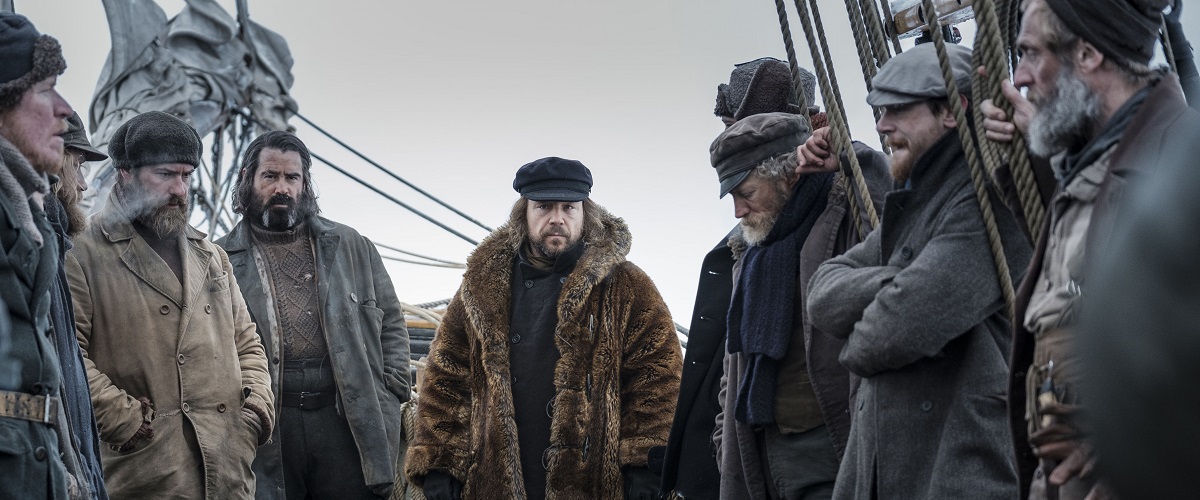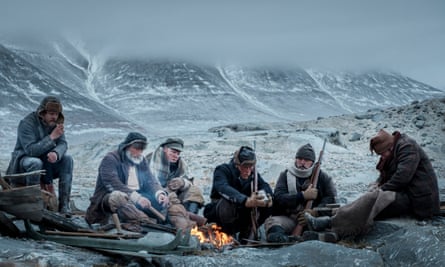Film Review: The North Water (2021) – A Haunting Arctic Tale of Survival and Brutality
The North Water (2021) is a chilling, brutal miniseries that plunges viewers into the unforgiving world of 19th-century Arctic whaling. Adapted from Ian McGuire’s acclaimed 2016 novel and directed by Andrew Haigh, this five-part BBC and AMC+ co-production is a visually stunning and psychologically harrowing exploration of violence, isolation, and moral decay set against the stark beauty of the polar north.
Set in 1859, the series follows Patrick Sumner (Jack O’Connell), a disgraced former army surgeon who joins a whaling expedition aboard the Volunteer, seeking redemption and escape from a dark past. As the ship journeys into the Arctic Circle, it becomes evident that Sumner is not the only man carrying heavy secrets. Among the crew is Henry Drax (Colin Farrell), a harpooner and embodiment of pure savagery—amoral, brutal, and dangerous.

The narrative slowly unfolds into a descent into both physical and moral wilderness. The ship’s voyage is not what it seems; the owner, Baxter (Tom Courtenay), has ulterior motives, and soon the whalers are trapped in ice with no hope of rescue. As tensions rise and conditions worsen, man turns against man, and the struggle for survival grows increasingly desperate.
The most striking aspect of The North Water is its unflinching depiction of harshness—both in nature and human nature. The cinematography, by Nicolas Bolduc, captures the bleak magnificence of the Arctic with sweeping, icy vistas and claustrophobic scenes aboard the grimy ship. Impressively, the production filmed on location in the Arctic, making it one of the first scripted TV series to shoot so far north. This commitment to realism gives the series an authenticity few others can match.

Colin Farrell delivers a terrifying and transformative performance as Drax. With a heavy beard, grim demeanor, and guttural accent, he is nearly unrecognizable. Drax is not merely a villain; he is a force of nature—chaotic, primal, and fascinating to watch. Opposite him, Jack O’Connell’s Sumner serves as the moral counterweight: introspective, wounded, and trying to hold onto a sense of right and wrong in a world slipping into madness.
Thematically, The North Water explores survival not just as a physical challenge, but as a moral one. It asks whether decency can exist in a world ruled by brutality, and whether a man can reclaim his soul when surrounded by monsters. The contrast between Sumner’s attempts at civility and Drax’s complete lack of humanity is central to the narrative tension.

Critics praised the series for its intense performances, stark visuals, and philosophical undertones. Some found the pacing slow, particularly in the earlier episodes, but most agreed that the show’s atmosphere and depth rewarded patient viewing. The sound design and score further immerse viewers into the bleak cold of the Arctic, amplifying the sense of dread and desolation.
In conclusion, The North Water is a gripping, haunting tale of men pushed to the edge—both geographically and morally. It’s not an easy watch, but it is a powerful one, offering a chilling meditation on the nature of man, the pull of violence, and the thin veneer of civilization. For viewers who appreciate historical drama with teeth, it is essential viewing.
-1751940697-q80.webp)

